Recently, searching through boxes containing ancient paperwork, I found the manuscript of my very first novel! Unsurprisingly, it was also my first book to be rejected.
Though this was ages ago – we’re talking late 90s – I still remember plenty of things about that experience. Perhaps some factual details are a bit different (memory is a tricky thing when it comes to that), but I certainly remember the “how it felt” part very well. In any case, I certainly don’t intend to read such a super-cringe old thing.
So join me in this hilarious trip of recollection, where the road to literary hell was paved with good intentions, and let’s make fun of my naïveté!


